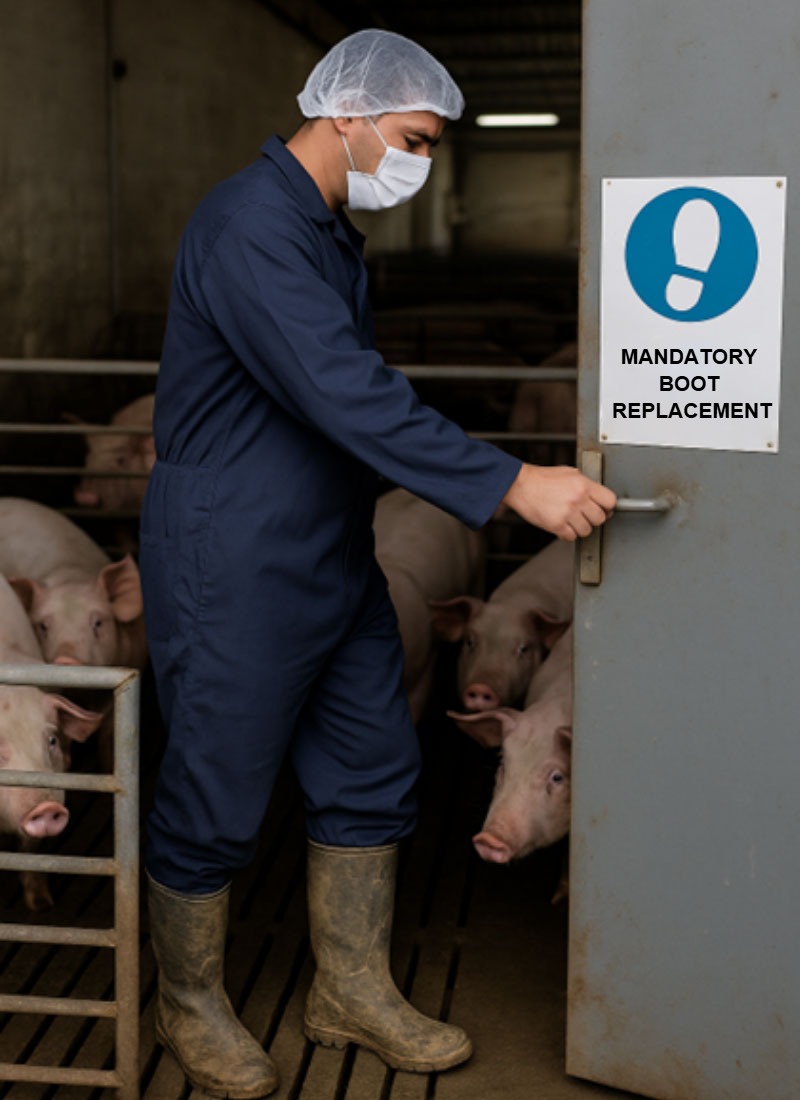Within the every day operation of a pig farm, it’s common to come across conditions the place issues don’t go as anticipated: a step is omitted, a mistake is made, or somebody deviates from protocol. When confronted with these occasions, the quick response is usually to determine the “culprits” and apply sanctions. Nevertheless, if we need to enhance security and well-being at work, we have to perceive extra exactly what is going on. Was it a mistake or a transgression? The reply adjustments the whole lot.
Errors should not punished
Errors are unintentional acts. Nobody chooses to make errors. They’re the results of fatigue, extreme workload, insufficient coaching, or restricted abilities to carry out sure duties.
Errors are categorised into three varieties (James Motive, 1997):
- Slip: Automated actions carried out incorrectly, resembling urgent the incorrect button.
- Lapse: Failures in reminiscence or consideration, resembling forgetting a step in a process.
- Mistake: Incorrect choices made with good intentions, as a consequence of a ignorance or coaching.
Imposing penalties in these instances will not be solely unfair but in addition reduces an individual’s willingness to report incidents. As a substitute, it is sensible to ask, “What situations allowed the error to happen? Had been the directions clear? Was the process practical?”
Let’s take an instance from a farm: A employee administers medicine to the incorrect sow as a result of he misinterpret the identification quantity. His supervisor punishes him and imposes a penalty. From then on, this employee will have a tendency to cover his errors to keep away from additional penalties, which can ultimately have an effect on the well being and efficiency of the animals in his care within the medium or long run.
After we handle errors systematically, we cease punishing signs and begin addressing the actual causes.
Transgressions are additionally an indication
A transgression is when somebody voluntarily breaks a rule. At first, this appears to deserve punishment. Nevertheless, it could be an issue to imagine that such habits is only particular person. Proof from the sphere of human components reveals the alternative (ICAO, 2023).
Most transgressions happen as a result of working situations facilitate, promote, and even reward them (Dekker, 2012). In different phrases, the issue has to do with the construction, not the individual.
There are 4 forms of transgressions:
- Routine: They change into a part of on a regular basis life; everybody does it, maybe even with their supervisors’ data. For instance, on a farm with solely two showers, employees could cease showering each time they enter the power to avoid wasting time.
- Induced: These happen when there are conflicting targets or messages. For instance, complying with protocols vs. rushing up manufacturing. On a farm, employees are educated to wean wholesome piglets with good weights, however they could additionally obtain bonuses for the variety of piglets weaned, which inspires them to ship even stunted or sick piglets to the nursery part with a purpose to meet the goal.
- Organizational optimization: The employee breaks a rule to profit the corporate. An instance of any such transgression on a farm is when an worker decides to ship pigs to slaughter regardless that they know that they haven’t met the withdrawal interval necessities.
- Private optimization: Particular person profit is sought (much less effort, much less time). A sensible instance is when employees cease weighing all piglets at farrowing as a result of they’re attending to a number of farrowings concurrently.
The primary three mirror system failures. If a transgression is frequent, what is required will not be punishment, however evaluation: What situations are selling it?
We tolerate on a regular basis transgressions… till an incident happens

A typical mistake in organizations is to punish the consequence, not the habits. For instance, many employees could skip altering their boots between areas with out repercussions. This habits is ignored and even normalized.
However on the day that cross-contamination happens and somebody who did not comply is recognized, they’re punished as if their motion had been distinctive. In actuality, what modified was not the habits, however the consequence.
This method punishes those that had “unhealthy luck” and leaves intact the cultural sample that permits on a regular basis transgressions. If we need to forestall this, we should cease performing solely when there are severe penalties and begin observing habits.
What guidelines are solely adopted “when there are guests”? What guidelines exist on paper however not in follow? What practices will we all the time tolerate, till they trigger us an issue?

Handle higher, punish much less
Desk 1. Variations between error and transgression in every day work. Comparability within the context of a pig farm.
| Side | Error | Transgression |
|---|---|---|
| Intention | Not intentional | Intentional |
| Frequent trigger | Fatigue, multitasking, lack of coaching | Organizational tradition, strain for outcomes, acquired behavior |
| On-farm instance | Forgetting to document a dose as a consequence of distraction | Ignoring biosecurity protocols as a result of “nothing ever occurs” |
| Really helpful administration | Evaluation of situations, redesign of duties | Organizational trigger evaluation and system changes |
| Danger of poor administration | Punishment reduces error reporting | Punishing with out understanding perpetuates the issue |
Errors and transgressions reveal crucial factors in a farm’s operation. Errors present human limitations. Transgressions (when there is no such thing as a egocentric intent) are signs of processes or cultures that should be reviewed (Desk 1). Each are alternatives for enchancment if we cease searching for culprits and begin redesigning methods that assist those that work day after day.

